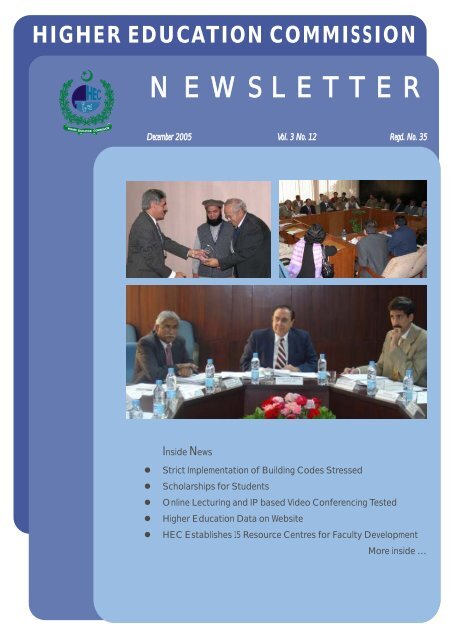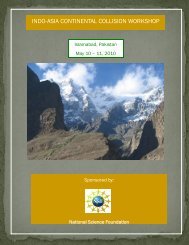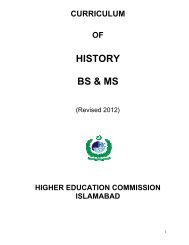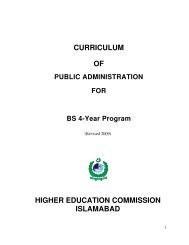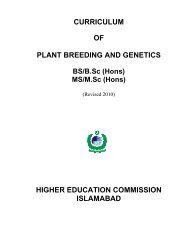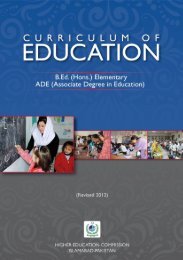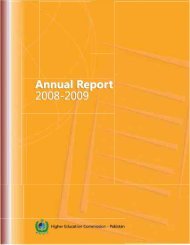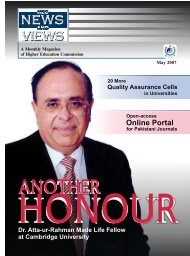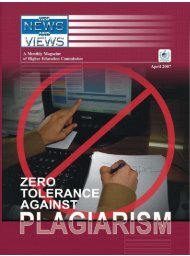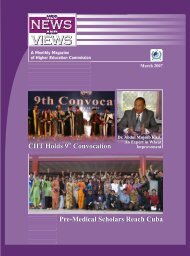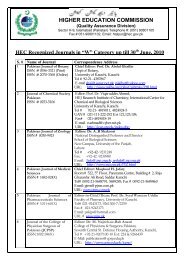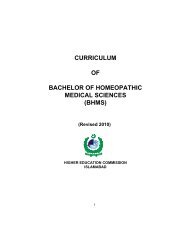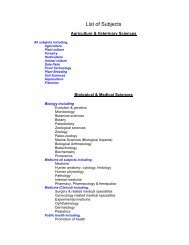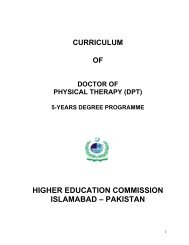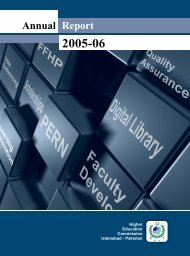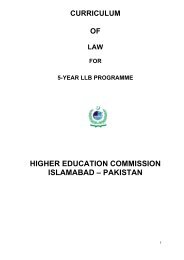Download - Higher Education Commission
Download - Higher Education Commission
Download - Higher Education Commission
Create successful ePaper yourself
Turn your PDF publications into a flip-book with our unique Google optimized e-Paper software.
HIGHER EDUCATION COMMISSION<br />
NEWSLETTER<br />
HI<br />
G<br />
H<br />
ER<br />
E<br />
D<br />
UC I<br />
TA I<br />
ON C<br />
O<br />
M M<br />
MM<br />
SIS<br />
O<br />
ISS<br />
I<br />
N<br />
December 2005 Vol. 3 No. 12 Regd. No. 35<br />
Inside News<br />
<br />
<br />
<br />
<br />
<br />
Strict Implementation of Building Codes Stressed<br />
Scholarships for Students<br />
Online Lecturing and IP based Video Conferencing Tested<br />
<strong>Higher</strong> <strong>Education</strong> Data on Website<br />
HEC Establishes 15 Resource Centres for Faculty Development<br />
More inside …
EVENT<br />
International Earthquake Rehabilitation Conference<br />
Strict Implementation of Building Codes Stressed<br />
Prof. Dr. Atta-ur-Rahman, Chairman <strong>Higher</strong> <strong>Education</strong> <strong>Commission</strong><br />
(HEC) has said that future construction of buildings, particularly in<br />
earthquake affected areas needs to be tailored to our local needs and<br />
problems.<br />
Formation of building codes and<br />
their proper implementation is,<br />
therefore essential so that in future<br />
we can prevent our country from<br />
further human and financial losses,<br />
he said.<br />
He was addressing the inaugural<br />
session of a two-day International<br />
Earthquake Rehabilitation<br />
Conference on “Seismology,<br />
Structure and Codes” as chief guest<br />
at HEC Auditorium, Islamabad. The<br />
Conference was organized by the<br />
NWFP University of Engineering and<br />
Technology, Peshawar in<br />
collaboration with <strong>Higher</strong> <strong>Education</strong><br />
<strong>Commission</strong>, Islamabad.<br />
Dr. Atta-ur-Rahman offered all<br />
possible financial assistance from<br />
the HEC for developing constructive<br />
projects laid out by the participants<br />
of the Conference. He further stated<br />
that National Centre of Excellence in<br />
Geology at University of Peshawar<br />
would be strengthened with more<br />
skilled faculty, equipment and<br />
resources. For the purpose, a<br />
substantial amount has already<br />
been allocated for the Centre.<br />
Syed Imtiaz Hussain Gilani, Vice-<br />
Chancellor, NWFP University of<br />
Engineering and Technology,<br />
Peshawar, in his opening speech<br />
stated the objectives of the<br />
Conference which included getting<br />
international experts involved to<br />
share their experience in hazard<br />
assessment and present the<br />
recommendations for<br />
reconstruction and designing<br />
Dr. Atta-ur-Rahman, Chairman HEC and Mr. Imtiaz Hussain Gilani make<br />
inaugural speeches at the Conference.<br />
building codes that are relevant to<br />
our local needs. He revealed that<br />
UET Peshawar has already taken a<br />
lead in establishing the national<br />
earthquake, engineering centre<br />
funded by the HEC.<br />
This Centre will basically work for<br />
faculty development, need-based<br />
research and strategy for building<br />
structures.<br />
He also mentioned that some<br />
construction has already been<br />
started in affected areas without any<br />
proper strategy. He urged the<br />
participants to come up with solid<br />
recommendations, so that they<br />
could be strictly followed during<br />
reconstruction phase.<br />
The Vice-Chancellor said that the<br />
Conference is aimed to bring in<br />
experts from the related field and to<br />
start the debate so that best-fit<br />
solutions for the reconstruction and<br />
rehabilitation phase could be found.<br />
This is the first of a series of six<br />
thematic workshops that will be<br />
conducted under the aegis of HEC.<br />
The recommendations will be<br />
presented to HEC for<br />
implementation, he added.<br />
Major General Nadeem, Vice-<br />
Chairman of General Staff (VCGS)<br />
presented an overview of damages<br />
and management strategy of<br />
Federal Relief <strong>Commission</strong>. He<br />
stressed the need to design building<br />
codes as early as possible before the<br />
reconstruction of affected areas<br />
starts.<br />
The Conference was attended by<br />
almost 200 participants from<br />
different institutions, organizations<br />
and departments of Pakistan such as<br />
Geological Survey of Pakistan<br />
(GSP), National Institute of Science<br />
and Technology (NUST), Works and<br />
Services Department, Centre of<br />
Excellence in Geology, Peshawar,<br />
University of Science and<br />
Technology Lahore, University of<br />
Science and Technology Taxila,<br />
Pakistan Atomic Energy<br />
<strong>Commission</strong>, Military College of<br />
Engineering (MCE) Risalpur,<br />
National Institute of Transportation<br />
(NIT) Risalpur, Allama Iqbal Open<br />
University and Ghulam Ishaq Khan<br />
(GIK) institute Topi.<br />
Researchers, professionals and<br />
building code regulators for the<br />
Earthquake Engineering Research<br />
Institute, (EERI), which is the<br />
recognized national authoritative<br />
source for earthquake risk reduction<br />
in USA, attended the Conference.<br />
The participants perceived the need<br />
for developing national building<br />
codes, as well as its enforcement<br />
through proper legislation. The<br />
group also recognized the need for<br />
public awareness programmes<br />
having training and counselling<br />
components, so that general public<br />
can handle such situations in future.<br />
It was strongly recommended that<br />
Pakistan should strengthen its<br />
2<br />
<strong>Commission</strong> Newsletter
EVENT<br />
emergency disaster management<br />
system to make easy and rapid<br />
access to affected areas. The need<br />
for new tectonic maps was also felt<br />
and one group recommended the<br />
redesigning of tectonic maps with<br />
improved proper attributes and<br />
strain rates.<br />
Moreover, earthquake hazard<br />
assessment, another group<br />
recommended, should be taken up<br />
on national scale as long-term<br />
process, which should be supported<br />
by research and nation<br />
wide instrumentation.<br />
In this regard, a task<br />
force should be<br />
appointed to propose<br />
the first version of<br />
hazard maps to serve<br />
the basis of hazard<br />
zonaton map to be<br />
incorporated in the new<br />
earthquake resistant<br />
design code.<br />
the rest of countries. “Similarly less<br />
information about loading rates in<br />
Pakistan is available”, she said<br />
adding that an earthquake beneath<br />
a large city in Pakistan could kill<br />
more than one million people.<br />
Elaborating the topic 'Geological and<br />
tectonics of Northern Pakistan with<br />
respect to earthquake' Ahmed<br />
Hussain from Geological Survey of<br />
Pakistan said that the October 8<br />
earthquake was triggered by<br />
Balakot-Bagh thrust which is an<br />
Vulnerability Assessment of<br />
Masonry Structures”.<br />
Prof. Dr. Miha Tomazevic from<br />
Earthquake Engineering Institute<br />
Ljubljana, Slovenia spoke on<br />
“Seismic Design and Retrofitting of<br />
Masonry Structures”. He stressed<br />
the need for verification of<br />
structures which are necessary for<br />
checking their resistance against<br />
earthquakes.<br />
He further said that rules and<br />
procedures should be<br />
considered in the design of<br />
new as well as re-design of<br />
existing masonry<br />
structures.<br />
Dr. Mona Lisa, from Quaidi-Azam<br />
University,<br />
Islamabad spoke on<br />
seismic activity and<br />
seismic hazard<br />
assessment along main<br />
boundary thrust (MBT),<br />
Pakistan.<br />
Chairing the first<br />
technical session, Dr.<br />
Asif Ali Khan Director<br />
Centre of Excellence in<br />
Geology, Peshawar highlighted the<br />
need of future construction of<br />
buildings particularly in affected<br />
areas.<br />
Giving presentation on 'Seismic<br />
Disaster Mitigation in Pakistan' Prof.<br />
Dr. Qaiser Ali, NWFP UET Peshawar<br />
said that low seismic capacity<br />
buildings are due to low quality<br />
material, improper design and<br />
construction or building constructed<br />
on loose oil etc, will make the<br />
structure vulnerable to collapse<br />
during on earthquake.<br />
He emphasized both long and shortterm<br />
measures and proper<br />
structural assessment before<br />
making scientific buildings.<br />
Speaking on 'Seismic Hazards and<br />
Tectonics of Pakistan' Rebecca<br />
Bendick, University of Montana,<br />
USA was of the view that insufficient<br />
data is available about earthquake<br />
recurrence rates in Pakistan than<br />
Maj. Gen. Nadeem, Vice-Chairman of General Staff (VCGS)<br />
presents an overview of relief operation.<br />
offshoot of main boundary. The<br />
epicenter of the aftershocks<br />
suggests that the fault may be<br />
extending towards Alai area in<br />
northwest direction.<br />
Mr. Zahid Ali (MSSP, PINSTECH)<br />
speaking on the 'Seismology of<br />
Kashmir earthquake 2005' said that<br />
preparedness is necessary as<br />
compared to prediction. Building<br />
codes should be adopted and more<br />
work needed to fault features.<br />
Second Technical Session on<br />
“Structures and Codes” was chaired<br />
by Prof. Dr. Mohsin Iqbal. During this<br />
session international experts spoke<br />
and shared technical statistics of<br />
seismic hazards and vulnerability.<br />
Dr. Claudius Strobia, from European<br />
Centre for Training and Research in<br />
Earthquake Engineering, Italy spoke<br />
on “Seismic Hazards Assessment<br />
and Importance of Soil<br />
Characteristics”. Dr. Andrea Penna<br />
presented statistics on “Seismic<br />
Engr. Saif Hussain from<br />
EERI, USA presented an<br />
overview of “US Seismic<br />
Codes Development<br />
Process and Implementation<br />
Strategies”. He said that US codes<br />
and guidelines are comprehensive,<br />
however, a performance based<br />
approach during designing is<br />
necessary to consider because most<br />
building codes are not performance<br />
based. In Pakistan, he added, for the<br />
time being these building codes can<br />
be used for construction with few<br />
amendments.<br />
Dr. Sohail Naqvi chaired the third<br />
technical session on “Structures<br />
Codes”. During this session,<br />
international speakers presented<br />
their papers on different topics. Prof.<br />
Dr. Mustafa Erdik from Earthquake<br />
Engineering Research Institute, USA<br />
in his presentation on “Urban<br />
Earthquake Risk and Mitigation”,<br />
said that learning from other<br />
countries to cope with such<br />
situations was also important.<br />
It was imperative that certain<br />
preparedness and emergency<br />
<strong>Commission</strong> Newsletter 3
EVENT<br />
procedures were used by a careful<br />
comprehensive evaluation of<br />
earthquake damages, he added.<br />
Speaking on “Rehabilitation<br />
Reconstruction Iranian experience<br />
after Bam” Bijan Khazai, from<br />
Earthquake Engineering Research<br />
Institute, USA, stressed that<br />
material and technology to be used<br />
for rehabilitation must be<br />
indigenous and should suit the local<br />
needs and no external designs<br />
solution should be imposed.<br />
Prof. Dr. Zoran Milutinovic, Institute<br />
of Earthquake Engineering and<br />
Seismology, Macedonia shared his<br />
experience on planning for disaster<br />
preparedness/management.<br />
He stated that disaster is not only a<br />
physical loss problem, but a socioeconomic<br />
event on a national scale.<br />
Therefore the need to plan ahead to<br />
prevent the country from such a<br />
devastating loss<br />
in future is critical<br />
to follow.<br />
Prof. Dr. Nuray<br />
Aydinoglu,<br />
Department of<br />
Earthquake<br />
Engineering<br />
B o g a z i c i<br />
University,<br />
Istanbul, Turkey<br />
shared Turkish<br />
experience in<br />
post earthquake<br />
rehabilitation.<br />
He said that<br />
Turkish government designed a<br />
national Recovery/Preparedness<br />
Programme with the support of<br />
World Bank and European Union. He<br />
emphasized the need for new<br />
legislation in engineering,<br />
architecture, building design and<br />
construction control.<br />
Participants of the Conference<br />
shared their comments and<br />
suggestions during the group<br />
discussion, followed by working<br />
session based on four themes<br />
including Seismic Hazard<br />
Assessment, headed by Dr. Mustafa<br />
A future<br />
earthquake could<br />
kill more than a<br />
million people<br />
Erdik, Seismic Vulnerability of<br />
Structures, by Prof. Dr. Miha<br />
Tomazevic, Building Codes<br />
Development and Implementation,<br />
by Dr. Nuray Aydinoglu and fourth<br />
theme was Disaster Management<br />
headed by Prof. Dr. Zoran<br />
Milutinovic.<br />
Dr. Atta-ur Rehman while speaking<br />
at the concluding session, said that<br />
financial assistance from<br />
international community and<br />
technical expertise is coming to<br />
Pakistan, but, it is the time for<br />
universities and higher learning<br />
institutions to play their part.<br />
The earthquake engineers,<br />
seismologists, geologists and<br />
researchers, he said, from the<br />
related field should come forward<br />
and come up with guidelines and<br />
proposals so that during the<br />
reconstruction phase, these<br />
guidelines should be taken into<br />
consideration.<br />
In future,<br />
Pakistan should<br />
have some<br />
p r o p e r<br />
mechanism to<br />
cope with such<br />
situations he<br />
continued.<br />
He appreciated<br />
the efforts of<br />
UET Peshawar in<br />
taking the lead<br />
in involving<br />
international<br />
experts and<br />
suggesting<br />
solutions to the government.<br />
He announced that a task force will<br />
be formed under the supervision of<br />
Vice Chancellor NWFP UET Engr.<br />
Syed Imtiaz Hussain Gilani that<br />
would forward these proposals to<br />
HEC for financial support.<br />
He also said that a plan of action will<br />
be made to strictly follow these<br />
recommendations laid down by the<br />
participants of the Conference.<br />
Scholarship for<br />
Meritorious Students<br />
HEC has announced a need based<br />
scholarship programme for those<br />
students who are studying in first<br />
professional year and have secured<br />
admission or expected to get<br />
admission in specific disciplines of<br />
medical and life sciences offered by<br />
top universities of Pakistan and it is<br />
difficult for them to pursue their<br />
education because of financial<br />
constraints.<br />
The disciplines for which the<br />
scholarship slot has been allocated<br />
are Pharmacy (150 Scholarships),<br />
Bio-Technology and Bio-Medics (75<br />
scholarships), Genetics (55<br />
scholarships), and Medical & Life<br />
Sciences (20 scholarships). This<br />
programme is specifically for undergraduate<br />
and graduate levels and do<br />
not cover MPhil or PhD level of<br />
studies.<br />
The universities selected for this<br />
particular programme include<br />
University of Karachi, University of<br />
Sindh, Jamshoro, Mehran University<br />
of Engineering and Technology,<br />
Jamshoro, University of the Punjab,<br />
Lahore, Government College<br />
University, Lahore, Lahore College<br />
for Women University, Lahore,<br />
Islamia University, Bahawalpur,<br />
Bahauddin Zakariya University,<br />
Multan, University of Sargodha,<br />
Government College University,<br />
Faisalabad, University of Peshawar,<br />
University of Balochistan, Quetta<br />
Students, who have secured<br />
admission or are expected to get<br />
admission in the above mentioned<br />
disciplines and universities during<br />
academic session of 2005-2006,<br />
2006-2007 and 2007-08, are<br />
eligible to apply for the<br />
scholarships. The scholarship<br />
covers full tuition fee, living<br />
expenses, transportation, books.<br />
Further details are available at HEC<br />
website www.hec.gov.pk. Mr. Jalil<br />
Ahmed, DG (SV&QA) or Mr. Salman<br />
Farid Programme Coordinator, HEC,<br />
Islamabad may be contacted via e-<br />
mail: nbs3@hec.gov.pk.<br />
4<br />
<strong>Commission</strong> Newsletter
EVENT<br />
HEC Sets Criteria for Affiliation of Colleges<br />
The <strong>Higher</strong> <strong>Education</strong> <strong>Commission</strong> has approved uniform criteria for<br />
affiliation of public/private colleges with the public sector<br />
universities and degree awarding institutions of Pakistan.<br />
Major decisions to promote quality<br />
of higher education were taken in<br />
th<br />
the <strong>Commission</strong>'s 9 meeting held<br />
on November 26, in Islamabad.<br />
Prof. Dr. Atta-ur-Rahman, Chairman<br />
HEC presided over the meeting.<br />
These criteria were developed after<br />
extensive consultation with all the<br />
stakeholders by the Quality<br />
Assurance Committee constituted<br />
by the HEC. The<br />
<strong>Commission</strong><br />
also approved<br />
the criteria of<br />
approval of<br />
journals to be<br />
recognized by<br />
the HEC and<br />
constituted a<br />
Sub-Committee<br />
for preparing a<br />
list of HEC<br />
a p p r o v e d<br />
journals. The<br />
Sub-Committee<br />
will submit its recommendations<br />
shortly.<br />
The <strong>Commission</strong> members<br />
appreciated the report of the Sub-<br />
Committee constituted by the<br />
Chairman HEC to review and<br />
evaluate the existing MPhil and PhD<br />
programmes of the universities and<br />
directed the HEC to obtain clear<br />
timeframe from the universities<br />
/degree awarding institutes by<br />
which they will improve and come<br />
up to the standard prescribed by the<br />
HEC in terms of faculty,<br />
infrastructure/laboratories,<br />
qualification, admission<br />
procedures, course conduct and<br />
examination. The <strong>Commission</strong><br />
directed that release of funds to the<br />
Chairman HEC and <strong>Commission</strong> Members deliberate matters at its 9th Meeting.<br />
non-compliant public sector<br />
universities and degree awarding<br />
institutions should be curtailed.<br />
The <strong>Commission</strong> also directed the<br />
HEC to initiate a programme for<br />
approval of departments of<br />
universities/institutes where PhD<br />
studies could be offered according<br />
to the set criteria to bring our PhD<br />
studies at par with world class<br />
degrees.<br />
The members who attended the<br />
meeting included Dr. M. Akram<br />
Sheikh, Deputy Chairman Planning<br />
<strong>Commission</strong>, Mr. Shehr Yar Khan,<br />
Acting Secretary, Ministry of<br />
Science and Technology, Lt. Gen<br />
(Retd) Muhammad Akram Khan,<br />
Vice-Chancellor UET, Lahore, Prof.<br />
Dr. Qasim Jan, Vice-Chancellor,<br />
QAU, Islamabad, Dr. Shahid Amjad<br />
Chaudhry, Rector Lahore School of<br />
Economics, Lahore, Mr. Nazir<br />
Saeed, Special<br />
Secretary, <strong>Higher</strong><br />
E d u c a t i o n ,<br />
Government of the<br />
Punjab, Dr. Anwar<br />
Nasim, Adviser<br />
S c i e n c e ,<br />
COMSTECH,<br />
Islamabad, Prof.<br />
Abdul Matin, Ex-VC,<br />
P e s h a w a r<br />
University, Prof. Dr.<br />
Saadia Chishti, Exmember,<br />
Council of<br />
Islamic Ideology,<br />
Mrs. Nadira Panjwani, Chairperson,<br />
Panjwani Foundation and Trusts,<br />
Karachi, Mr. Shahzad Alam, Chief<br />
Executive of Unitech Electronic<br />
(Pvt) Ltd. Lahore and Dr. S. Sohail<br />
H. Naqvi, Executive Director, HEC.<br />
AIT to Increase Academic Assistance<br />
The Asian Institute of Technology<br />
(AIT) Thailand aims at expanding its<br />
academic assistance to more<br />
educational institutions of Pakistan.<br />
This was stated by Prof. Said<br />
Irandoust, President AIT, Bangkok,<br />
who met Prof. Dr. Atta-ur-Rahman,<br />
Chairman HEC in November at the<br />
<strong>Commission</strong>'s Secretariat.<br />
Prof. Irandoust, with his two<br />
member delegation, lauded the<br />
efforts and initiatives being taken by<br />
the HEC. He stated that AIT will<br />
facilitate COMSATS in the fields of<br />
Information Technology and<br />
Telecommunication as a first step<br />
and the students enrolled under this<br />
programme will get AIT degree.<br />
During the meeting, AIT and HEC<br />
both agreed to further cooperate in<br />
higher education sector, Prof. Dr.<br />
Atta-ur-Rahman appreciated AIT's<br />
efforts for facilitating Pakistani<br />
institutions of higher learning in<br />
different advanced technological<br />
areas.<br />
“As we are already in touch with AIT<br />
and we will feel comfortable if more<br />
facilities from it are available to our<br />
universities and institutions of<br />
higher learning,” he said.<br />
After briefing of HEC initiatives,<br />
Prof. Dr. Atta-ur-Rahman<br />
emphasized that the fields to be<br />
enriched in the country were<br />
industrial designing, industrial<br />
biotechnology, telecommunication,<br />
material sciences and application of<br />
information technology.<br />
In this regard AIT could be capable<br />
of providing Pakistan a bridge to<br />
develop these particular fields.<br />
<strong>Commission</strong> Newsletter 5
EVENT<br />
Accreditation Council for Teacher <strong>Education</strong> Formed<br />
<strong>Higher</strong> <strong>Education</strong> <strong>Commission</strong> has<br />
constituted Pakistan Accreditation<br />
Council for Teacher <strong>Education</strong><br />
(PACTE) to carry out accreditation of<br />
institutions including their<br />
departments, faculties and<br />
disciplines giving them appropriate<br />
ratings.<br />
In this regard a high level meeting,<br />
chaired by HEC Executive Director<br />
Professor Dr. S. Sohail H. Naqvi, was<br />
held at HEC headquarters.<br />
It was unanimously decided that all<br />
accreditation granted by the Council<br />
(PACTE) would be used as<br />
assurance for quality in teachers<br />
education degree programme of<br />
different educational institutions.<br />
Accreditation would be a mandatory<br />
process for all relevant academic<br />
programmes offered by public and<br />
private sector institutions. The<br />
incentive for obtaining such<br />
accreditation would help enhance<br />
recognition in the teaching<br />
community.<br />
NACTE would systematize and<br />
execute a comprehensive process of<br />
accreditation teacher education<br />
degree programmes and would also<br />
assist and advise teachers<br />
education institutions in planning<br />
their academic and professional<br />
programmes.<br />
The major functions of the NACTE<br />
would be not only to study and<br />
develop policies and process for<br />
accreditation of teacher education<br />
programmes leading to degree but<br />
also to lay down a criterion on which<br />
teacher education degree<br />
programmes would be assessed.<br />
It would be responsible of inspecting<br />
all such teacher education<br />
institutions for ascertaining whether<br />
those institutions are functioning in<br />
accordance with the provision of<br />
relevant universities regulations<br />
and practices.<br />
PACTE will also approve a list of<br />
auditors in the field of <strong>Education</strong> to<br />
participate in the process of<br />
accreditation of Teacher <strong>Education</strong><br />
Degree Programmes and will<br />
constitute an Accreditation<br />
Inspection Committee (AIC) to<br />
conduct peer review of Teacher<br />
<strong>Education</strong> degree programmes.<br />
The Council will be a good<br />
instrument to protect and promote<br />
the interest of all stakeholders for<br />
providing quality education in the<br />
field of Teacher <strong>Education</strong>.<br />
HEC to Establish a Model Centre of English Language<br />
Teaching and Research<br />
HEC will initiate a Model Centre of<br />
English Language Teaching and<br />
Research (CLTR) in Islamabad and<br />
the programme will be expanded to<br />
other cities. The decision was made<br />
in the meeting of National<br />
Committee in English (NCE) held at<br />
HEC Regional Centre Lahore. It has<br />
been decided that the criteria for<br />
establishing this model centre<br />
would be finalized by NCE based on<br />
the recommendations made by it<br />
through its sub-committees.<br />
It has also been decided that the<br />
NCE would undertake a pilot project<br />
on online training, language<br />
learning and creating interactive<br />
groups for training.<br />
Prof. Dr. Riaz Hussain Qureshi<br />
Adviser (QA&LI) HEC, in his<br />
inaugural remarks emphasized the<br />
importance of English for graduate<br />
and post-graduate students of<br />
professional and general<br />
institutions of higher education in<br />
Pakistan. He requested the NCE to<br />
come up an action plan for<br />
implementation by the HEC to<br />
overcome this deficiency.<br />
He desired that NCE should<br />
coordinate with institutions of<br />
higher education for improving the<br />
standard of English language<br />
Committee to Look Into<br />
Fake Degrees Issue<br />
Prof. Dr. Atta-ur-Rahman, Chairman<br />
HEC, has constituted a four-member<br />
committee to look into the issue of<br />
fake degrees awarded in the name<br />
of public and private sector<br />
universities and institutions of<br />
Pakistan.<br />
Justice (Retd) Saleem Akhtar will be<br />
the Chairman of the Committee<br />
while Prof. Dr. S.I.Ali, former Vice-<br />
Chancellor, University of Karachi,<br />
Prof. Dr. Anwar Gillani from Aga<br />
Khan University Karachi and Prof.<br />
Pirzada Qasim Raza Siddiqui, Vice-<br />
Chancellor, University of Karachi<br />
have been nominated members of<br />
the said Committee.<br />
The Committee has been assigned<br />
not only to look into the issue of fake<br />
degrees in totality, but also to probe<br />
specific cases on receipt of<br />
complaints and recommend steps to<br />
be taken by HEC in each case.<br />
The Committee will work in close<br />
coordination with the Quality<br />
Assurance Committee (QAC) of HEC<br />
and shall take suo-moto action if any<br />
irregularity comes to its notice.<br />
teaching and learning in Pakistan.<br />
The meeting was attended by Prof.<br />
Dr. Riaz Hussain Qureshi, Adviser<br />
(QA & LI), <strong>Higher</strong> <strong>Education</strong><br />
<strong>Commission</strong> and NCE members, Dr.<br />
Samina Qadir (FJWU), Dr. Shahid<br />
Siddiqui (LUMS), Dr. Sabiha<br />
Mansoor (AKU), Dr. Rubina Kamran<br />
(NUML), Ms. Saira Abbas (BUQ), Mr.<br />
Umar Farooq (AIOU), Dr. Raja<br />
Naseem Akhtar (JKU), Ms. Saba<br />
Khalil (VU), Prof. Amra Raza (Punjab<br />
University), Prof. Kaleem Raza (KU),<br />
Khurram Shahzad (Coordinator,<br />
NCE & PDO ELTR project, Mr. Ejazur-Rahman<br />
(PDO ETR project) and<br />
Mr. Naveed Hussain Shah (SAELTR<br />
project) while Prof. Zakiya Sarwar<br />
from University of Karachi chaired<br />
the meeting.<br />
6<br />
<strong>Commission</strong> Newsletter
QUALITY ENHANCEMENT<br />
Online Lecturing and IP-based Video<br />
Conferencing Tested<br />
The <strong>Higher</strong> <strong>Education</strong> <strong>Commission</strong>, Islamabad has initiated a project<br />
entitled “Online Lecturing and Net-Meeting using IP-based Video<br />
Conferencing System” which aims at providing interactive and online<br />
lecturing services to all the public sector universities.<br />
<strong>Higher</strong> <strong>Education</strong> Data on<br />
Website<br />
The <strong>Higher</strong> <strong>Education</strong> <strong>Commission</strong><br />
has decided to place the country's<br />
higher education data on its official<br />
website.<br />
Video conferencing is an extremely<br />
useful method of communication<br />
because it saves people the time,<br />
In order to perform this<br />
demonstration session successfully<br />
universities/institutes were<br />
The website contains all the<br />
information provided by 101<br />
universities and degree-awarding<br />
institutions about their last three<br />
years' activities.<br />
Information posted on the website,<br />
besides other relevant data,<br />
contains gender-wise enrolment,<br />
details about faculty, academic<br />
programmes and graduates<br />
produced by the public and private<br />
sector universities and degree<br />
awarding institutions of Pakistan.<br />
View of sites connected through video conferencing<br />
expense, travel and can often<br />
accomplish many of the things a<br />
physical meeting can. Though not<br />
new, the technology has the<br />
potential of becoming ground<br />
breaking as a communication tool<br />
for Pakistani universities. In the<br />
first phase of the project 24<br />
universities/ degree awarding<br />
institutions are being provided with<br />
these facilities at a cost of Rs.100<br />
million.<br />
Six companies have bid for the<br />
tender and gave three live<br />
demonstrations in November for<br />
evaluation on technical grounds.<br />
As part of the overall technical<br />
evaluation process these vendors<br />
were asked to provide a live<br />
demonstration of their quoted<br />
products as well as the proposed<br />
solution. For this purpose they setup<br />
their video conferencing system<br />
at least three sites at different<br />
locations. The project is envisioned<br />
for PERN-connected universities/<br />
institutions.<br />
requested to arrange and provide a<br />
conference room/lecture room to<br />
set-up these video conferencing<br />
equipments for this demonstration.<br />
In this connection the video<br />
conferencing set-up was arranged<br />
at six locations across Pakistan,<br />
including HEJ Karachi, COMSATS<br />
Mr. Anwaar Amjad, IT Consultant &<br />
Dr. Faiz Ishaq, Dean Computer Sciences<br />
COMSATS view conferencing session.<br />
Institute of Information Technology,<br />
Liaquat University of Medical and<br />
Health Sciences, University of<br />
Peshawar, UET, Lahore and <strong>Higher</strong><br />
<strong>Education</strong> <strong>Commission</strong>, Islamabad.<br />
The <strong>Commission</strong> has requested<br />
educationists, teachers, students<br />
and the masses to cooperate in<br />
updating this information.<br />
Information on enrollment covers<br />
the period of three years from 2001-<br />
02 to 2003-4.<br />
HEC Approves Rs 17.23<br />
million Project<br />
HEC has approved a development<br />
project worth Rs 17.23 million for<br />
University of Veterinary and Animal<br />
Sciences (UVAS) Lahore.<br />
The project “Provision of Hostel for<br />
Visiting Faculty at UVAS” will be<br />
completed in 12 months. Under the<br />
project, a hostel will be constructed<br />
for accommodating at least 10-15<br />
foreign visiting faculty members.<br />
Other facilities will also be provided.<br />
These facilities will help improve<br />
quality of teaching and research.<br />
The UVAS is already working with<br />
HEC for Foreign Faculty Hiring<br />
Programme and has provided need<br />
assessment for various disciplines.<br />
Since establishment of the<br />
University in 2002, over a dozen<br />
expatriate Pakistani veterinary<br />
experts have visited the UVAS and<br />
delivered lectures.<br />
<strong>Commission</strong> Newsletter 7
WORKSHOP<br />
HEC Establishes 15 Resource Centres for Faculty Development<br />
The <strong>Higher</strong> <strong>Education</strong> <strong>Commission</strong><br />
plans to establish 15 faculty<br />
development resource centres at<br />
different public sector universities of<br />
Pakistan.<br />
HEC has taken this step by<br />
identifying the need and challenges<br />
of the professional development of<br />
teachers at higher education level<br />
through intensive in-service training<br />
as it is an inevitable pre-requisite to<br />
improve the quality of education.<br />
National Academy of <strong>Higher</strong><br />
<strong>Education</strong> (NAHE) of the HEC has<br />
taken this initiative in order to<br />
provide facilities of professional<br />
development to maximum faculties<br />
of the universities. For the purpose<br />
Faculty Development Courses would<br />
be started at 15 centres under NAHE<br />
throughout the country.<br />
In this regard a meeting of<br />
coordinators of Resource Centres<br />
was held at HEC, Islamabad. Prof.<br />
Dr. S. Sohail H. Naqvi, Executive<br />
Director HEC chaired the meeting.<br />
He expressed his gratitude and<br />
appreciation for the centres for<br />
exhibiting full devotion in arranging<br />
the courses which fulfill the<br />
requirement of teachers'<br />
professional growth through<br />
pedagogical training in an efficient<br />
and effective manner.<br />
He assured the meeting that there<br />
will be no compromise on quality<br />
and training will be provided to the<br />
teachers which will equip them with<br />
the skills essential for teaching<br />
learning in the classrooms of 21st<br />
century.<br />
These centres have been<br />
established at Department of<br />
<strong>Education</strong>, Islamia University,<br />
Bahawalpur, Department of<br />
<strong>Education</strong>, Bahauddin Zakariya<br />
University, Multan, Sindh<br />
Agriculture University, Tandojam,<br />
NWFP University of Engineering &<br />
Technology, Peshawar, Kohat<br />
University of Science & Technology,<br />
Kohat, University of AJ&K,<br />
Muzaffarabad, Dow University of<br />
Health Sciences, Karachi, Institute<br />
of Administrative Sciences,<br />
University of the Punjab, Lahore,<br />
Balochistan University of<br />
Engineering & Technology Khuzdar,<br />
University of Agriculture,<br />
Faisalabad, Balochistan University<br />
of IT & Management Sciences,<br />
Quetta, Sardar Bahadur Khan<br />
Women University, Quetta,<br />
Institute of <strong>Education</strong> and<br />
Research, University of the Punjab,<br />
Lahore, National University of<br />
Modern Languages, Islamabad,<br />
Institute of <strong>Education</strong> and<br />
Research, University of the<br />
Peshawar and Lahore College for<br />
Women University, Lahore.<br />
Keeping in view the importance of<br />
training in communication and<br />
pedagogical skills, Staff<br />
Development Courses at these<br />
centres would be mandatory for the<br />
newly appointed teachers of the<br />
universities as well as degree<br />
awarding institutions. This initiative<br />
would be started with consultation<br />
of the VCs and the authorities<br />
concerned. Formative evaluation of<br />
the course would be conducted on<br />
regular basis and the courses would<br />
be monitored properly so that<br />
cushion action could be taken to<br />
remove the deficiencies.<br />
PCM and Logical Framework Workshop<br />
The European <strong>Commission</strong>'s Asia-<br />
Link Programme organized a four -<br />
day workshop on Project Cycle<br />
Management (PCM) and Logical<br />
Framework Approach for projects<br />
under Asia Link in Karachi from<br />
November 24-27, 2005.<br />
A group of 50 participants from<br />
higher educational institutions<br />
across Pakistan took part in the<br />
workshop, which was facilitated by<br />
German CPM experts and<br />
facilitators.<br />
Mr. Mohammad Ashraf (Director<br />
Planning), Dr. Muhammad Mazhar<br />
Saeed (Director Planning), Mr. Fida<br />
Husssain (Director Learning<br />
Innovation), Mr. Rana Shafiq<br />
(Project Director), Ms. Shehla<br />
Rizwan (Project Manager) and Mr.<br />
Anees Sadozai (Project Manager)<br />
from HEC attended the workshop.<br />
The Asia-Link Programme is a higher<br />
education programme that was set<br />
up by the EU in 2002 to promote<br />
regional and multilateral networking<br />
between higher education<br />
institutions in EU member states<br />
and South Asia, South-East Asia and<br />
China. The Programme has until<br />
now selected 126 projects for<br />
funding, bringing together higher<br />
education institutions in<br />
partnerships to develop human<br />
resources, draw up new curricula,<br />
and improve administration.<br />
A series of five pilot capacity<br />
building workshops taking place in<br />
Asia financed by the Asia-Link<br />
Programme have been carried out in<br />
November 2005. The objective of<br />
these capacity building workshops<br />
was to develop and enhance the<br />
skills of representatives of Asian<br />
higher education institutions in the<br />
principles of project design and<br />
project management, including the<br />
logical framework approach.<br />
The purpose of this workshop was to<br />
make potential grant applicants<br />
familiar with the European<br />
<strong>Commission</strong>'s project management<br />
instruments and procedure and<br />
enhance the capacity for project<br />
management among successful<br />
applicants and project partners<br />
under the Asia Link programme.<br />
The participating team of HEC will<br />
conduct a similar workshop session<br />
for the rest of the concerned HEC<br />
employees. The schedule of the<br />
training workshop will be displayed<br />
on the HEC website.<br />
8<br />
<strong>Commission</strong> Newsletter
INTERVIEW<br />
Recently an interview of Dr. Rahman<br />
was taken for HEC Newsletter who<br />
gave his opinion about the education<br />
system prevailing in Pakistan while<br />
comparing it with those of the<br />
developed nations.<br />
Although he strongly criticized the<br />
previous governments regarding<br />
their policies for the education<br />
sector, he was<br />
hopeful that the<br />
p r e s e n t<br />
government had<br />
taken good<br />
steps to improve<br />
the standard of<br />
education in the<br />
country.<br />
“ I f t h e<br />
successive<br />
governments<br />
had given due<br />
importance to<br />
the education<br />
sector, the<br />
scenario at<br />
present would<br />
have been very<br />
much different.<br />
But the policies adopted by the<br />
present government, especially<br />
concerning higher education, are<br />
steps in the right direction. We<br />
should not underestimate our<br />
manpower or resources. The things<br />
needed are commitment and<br />
sincerity”, he said.<br />
Talking about the different levels of<br />
education, he said although it not<br />
only exists in Pakistan yet this<br />
discrimination has a very bad impact<br />
on the overall situation. He said that<br />
the government should try to bring<br />
uniformity in the education system<br />
throughout the country.<br />
When asked about the reforms in<br />
the madressah education, Dr.<br />
Rahman disagreed with the idea<br />
that courses of religious schools<br />
should be revamped. He stressed<br />
that there are other factors and not<br />
‘Language Policy Needs Change’<br />
By Waseem Khaliqdad<br />
Dr. Tariq Rahman is a noted linguist who has achieved international recognition on the basis of his<br />
remarkable research work. He is a Distinguished National Professor whose books and articles are widely<br />
quoted in national and international literature.<br />
the religious education which leads<br />
to extremism or hatred. He clarified<br />
that this system is similar to that of<br />
catholic schools in the West where<br />
purely religious education is<br />
imparted.<br />
“Extremism has risen in the recent<br />
years however these schools have<br />
been imparting education for last<br />
many centuries”, he added.<br />
Dr. Rahman, a linguist of<br />
international repute, while talking<br />
about the importance of language in<br />
education, emphasized the vital role<br />
that language plays in the<br />
dissemination of knowledge. He<br />
deplored the little attention being<br />
given to the study and research in<br />
the field of linguistics.<br />
Emphasizing the need to give<br />
importance to provincial languages,<br />
he said that the language policy in<br />
Pakistan has favoured English in<br />
elitist interests. It has also favoured<br />
Urdu mainly in order to save the<br />
State from the assumed centripetal<br />
forces of language-based ethnicity.<br />
Therefore, this importance has<br />
weakened other languages of the<br />
country.<br />
Most people who know Dr. Tariq<br />
Dr Rahman has MA, M.Lit and PhD<br />
degrees from British universities. He<br />
has been a Fulbright Scholar at the<br />
University of Texas and guest speaker<br />
in several American universities and<br />
has published about 80 research<br />
papers and nine books. One of his<br />
books, Language and Politics in<br />
Pakistan (1996) has been given two<br />
awards by the Government. His book<br />
Language, Ideology and Power<br />
(2002) is on language teaching and<br />
he is increasingly writing on education<br />
in Pakistan. He is also a reviewer of<br />
books and contributes articles to the<br />
press. He has lectured and<br />
contributed seminar papers in<br />
Pakistan and abroad. His recent book<br />
is titled Denizens of Alien Worlds: A<br />
Study of <strong>Education</strong>, Inequality and<br />
Polarization in Pakistan.<br />
Rahman as a scholar and a<br />
columnist are not aware of the fact<br />
that he has written three books of<br />
short stories. The Third Leg, his<br />
third collection, contains 24 stories,<br />
all symbolically significant, yet<br />
conventionally realistic.<br />
To a question he answered that<br />
language and literature are two<br />
different but<br />
interrelated<br />
branches of<br />
learning. “Both<br />
have their own<br />
importance but I<br />
am sorry to say<br />
t h a t a s<br />
compared to<br />
literature, least<br />
importance has<br />
been given to the<br />
s t u d y o f<br />
linguistics.<br />
Language has a<br />
considerable<br />
impact on the<br />
culture and<br />
society of its<br />
speakers. There<br />
is a need to<br />
realize the importance of this area of<br />
study and take necessary steps in<br />
this regard”, he stated.<br />
While talking about the various<br />
programmes of HEC in different<br />
fields, he lauded the initiatives<br />
taken by the <strong>Commission</strong> but<br />
suggested that instead of scattering<br />
funds to so many institutions, these<br />
should be concentrated to selected<br />
universities and making them a<br />
institutions of international repute.<br />
“Necessary funds may be provided<br />
to the universities throughout the<br />
country but it would be more<br />
practical to concentrate most of<br />
these funds to two or three<br />
universities thus trying to make<br />
them internationally recognized<br />
institutions. The other important<br />
Continued on Page 18<br />
<strong>Commission</strong> Newsletter 9
ARTICLE<br />
Marketing E-resources to University Staff and Students<br />
By Amina Said<br />
<strong>Higher</strong> <strong>Education</strong> <strong>Commission</strong>'s Digital Library Programme aims to support information requirements of the research<br />
sector in Pakistan, by empowering the academic community with relevant online information resources and providing<br />
them skills to utilize this information. Working in concert with various initiatives of the <strong>Commission</strong>, the greater goal is<br />
to support the development of indigenous human capacity to manage the transition to the information culture, and<br />
enhance Pakistan's participation in the global knowledge economy.<br />
The recent evolution in the way information is shared and distributed through ICTs, has<br />
opened windows of opportunity for researchers in Pakistan. Historically, our underresourced<br />
university researchers were dependent on remote document and journal<br />
delivery options, or personal journal subscriptions, to meet their research needs.<br />
Greater investments in the telecommunications infrastructure, coupled with partnerships<br />
with organizations such as INASP and the US National Academies have allowed HEC to<br />
provide a vast quantity of information to researchers in institutions across the country.<br />
Researchers in Pakistan, who previously had access to only a handful of print<br />
publications, are now able to access cutting edge of research information from a wide<br />
range of publishers including Springer, Elsevier, the American Chemical Society and many<br />
more. The expansion strategy of the programme is geared towards providing information<br />
relevant to the particular research needs of each institution.<br />
Presently, there are over 20,000 journals being provided through the Programme, and a<br />
recent survey from Elsevier publishing claimed that the programme now covers almost<br />
70% of the world's peer-reviewed scientific content. Participating institutions include an<br />
estimate of over 150 organizations that include public sector universities, private sector<br />
universities and other research and development institutions. More institutions are being<br />
added on a regular basis which portrays the ever expanding sphere of researchers and<br />
academicians who can benefit from this Programme.<br />
The provision of access to databases is, however, not enough. The Digital Library Programme has faced many<br />
challenges, the greatest of which has been spreading awareness and encouraging usage of the resources acquired. This<br />
is owing to the fact that these resources are being marketed in an environment that is limited in its understanding of<br />
digital libraries. Librarians are traditional in their approach towards library management, given their experience of<br />
operating out of hybrid libraries, and find the electronic world slightly overwhelming.<br />
Various promotional material has been developed to promote awareness of the resources, including posters and<br />
pamphlets. These have been distributed throughout the campuses of participating institutions. Institutions have<br />
ensured that this material is displayed in their libraries and that students can obtain this information readily.<br />
Bookmarks containing uniform resource locators of all publisher databases are also distributed so that students have<br />
promotional material at hand to refer back to when conducting their searches.<br />
A comprehensive website has been developed to support the promotion of the Digital Library Resources. The official<br />
website has also been launched in May 2005 in an effort to create awareness and provide users with a central point of<br />
DL resource information. The website offers a user-friendly interface and covers detailed content information for digital<br />
library users, general users, librarians, researchers and students. Publisher information is made readily available and<br />
subject strengths are outlined for easy reference. Each participating institution has its own page carrying information<br />
about registered resources and contact details for representatives. Students and university staff can view a listing of<br />
what resources are being provided to them and directly link to the Publisher databases to begin their search.<br />
The website also holds a number of useful links to open access resources and various other scientific search engines to<br />
encourage users to help users locate scientific information on the Web. A section containing frequently asked questions<br />
(FAQs) has been added, that responds to the basic queries of users wanting to learn about the concept and application<br />
of digital libraries. It also covers questions relating to membership and publisher participation information that are<br />
specific to this Programme.<br />
The Digital Library Team has held a number of trainings to create awareness of these resources and at the same time,<br />
impart the knowledge and skills required for the successful use of these online assets. The trainings have been<br />
10<br />
<strong>Commission</strong> Newsletter
ARTICLE<br />
geographically spread through all the main regions of Pakistan, whereby teams of two or three members have actively<br />
conducted on-site promotion and training activities for users.<br />
User groups have been broadly defined into two categories; novice researchers conducting first time searches, and<br />
active researchers who are dynamically involved in research. The first group has been tackled by supplying general<br />
awareness training of what resources are available and simple concepts on how to search database interfaces.<br />
Target groups included students at Bachelors and Masters level, as well as faculty members and library staff. The<br />
second group received more subject specific awareness on the usage of resources. This group consisted mostly of PhD<br />
students and faculty members whose skills were refined through the training workshops. Achievements included<br />
introduction of users to the full range of electronic journals and scholarly databases available online, and those<br />
available specifically to their respective Institutions. The promotional material supplied and demonstration of the<br />
Digital Library website helped in clarifying where the information was to be sought.<br />
A priority initiative of the Digital Library Programme has been to introduce a one-window search interface known as the<br />
ELIN system. HEC and the International Network for the Availability of Scientific Publications have linked up with Lund<br />
Libraries, Sweden, to adapt and extend their existing Electronic Library Information Navigator (ELIN@) system so that<br />
it can be used by universities in Pakistan.<br />
Another recent initiative has been the development of a distance learning programme through which the Programme is<br />
to be promoted. The programme will involve development of content that can be supplied through the virtual university<br />
in the form of video tapes and broadcasted via the education channels acquired by the HEC. The team has fleshed out<br />
an outline that covers not only the basic digital library information but also explores resources in depth according to<br />
subject focus. Students will be able to learn the importance of the Digital Library and understand its effective<br />
application at their own pace from the comfort of their home or office. The television broadcasting will ensure deeper<br />
geographical penetration of information to students in relatively remote areas.<br />
The Knowledge Fair is an event that has been planned for the next year to celebrate all the research activities of HEC.<br />
The Festival will be organized in collaboration with HEC for students, academicians and researchers. The intent is to<br />
hold these events in major universities of Pakistan nationwide. This exhibition will not only promote the Digital Library<br />
Programme but it would also provide exposure for other programmes that have been chalked out for the enhancement<br />
of research capacity among the masses at a broader level.<br />
These activities are the milestones that promise the sustainability and growth of the Digital Library Programme in<br />
Pakistan. Our country has much to learn, yet, from those who are ahead in their expertise of managing and<br />
implementing Digital Libraries. It is established, however, that the need for e-resources is at its peak and countries<br />
must evolve their methods of communication and empower researchers by providing them with access to information.<br />
Orientation Course for HEC Employees<br />
The Learning Innovation Division<br />
st<br />
organized the 1 Training Course for<br />
newly inducted<br />
employees of<br />
HEC from<br />
October 24-26,<br />
2 0 0 5 .<br />
Participants<br />
included 31<br />
assistants and<br />
computer<br />
operators from<br />
different<br />
sections of HEC.<br />
The objective of<br />
the course was<br />
to introduce the<br />
participants to<br />
the working of HEC departments.<br />
Prof. Dr. Mukhtar Ahmad Member<br />
(O&P) inaugurated the course as<br />
chief guest<br />
a n d<br />
advised<br />
the new<br />
entrants<br />
to work<br />
w i t h<br />
dedication<br />
a n d<br />
devotion.<br />
T h e<br />
resource<br />
persons<br />
for the<br />
course<br />
were from<br />
Finance,<br />
Audit, Administration and Learning<br />
Dr. Riaz Hussain Qureshi shares his views<br />
with the participants.<br />
Innovation departments of the<br />
<strong>Commission</strong>.<br />
Prof. Dr. Riaz Hussain Qureshi,<br />
Adviser (QA&LI) was the chief guest<br />
on the concluding ceremony. While<br />
speaking to the gathering, he<br />
expressed satisfaction on the<br />
success of the course and advised<br />
the participants to work hard.<br />
He informed them that the Learning<br />
Innovation Department would<br />
continue to arrange similar courses<br />
in future to hone their professional<br />
development.<br />
Later on certificates were<br />
distributed among the participants.<br />
<strong>Commission</strong> Newsletter 11
UNIVERSITY PAGE<br />
Steps Afoot to Harmonize <strong>Education</strong>: Musharraf<br />
The Government plans to increase budgetary allocation for primary<br />
education to four per cent and is taking steps to harmonise English<br />
and Urdu mediums of instruction to equip the younger generation<br />
with proficiency in both languages, President General Pervez<br />
Musharraf said while speaking at the 4th Postgraduate Convocation<br />
of the National University of Science and Technology (NUST).<br />
The President said the Government<br />
was working on a comprehensive<br />
plan to raise the literacy level and lay<br />
country. The President informed the<br />
students that five engineering<br />
universities would be set up in the<br />
COMSATS Demonstrates<br />
Telehealth Project in<br />
Tunis<br />
On the sidelines of the World<br />
Summit on Information Society<br />
(WSIS), in the capital of Tunisia,<br />
COMSATS with the support of<br />
Canadian Development Agency,<br />
IDRC, demonstrated live its<br />
telehealth project using modern<br />
information communication<br />
technologies (ICTs).<br />
a sound base for higher education.<br />
The President promised that with the<br />
rising revenue collection, the<br />
Government would keep increasing<br />
allocation for education every year.<br />
He said the increase in allocation<br />
from 2.6 per cent to 4 per cent for the<br />
primary level would help lay a solid<br />
foundation for higher education as<br />
“having a weak base with super<br />
structure at the highest level will not<br />
be sustainable”.<br />
The President said the Government<br />
was also looking into harmonizing<br />
English and Urdu mediums of<br />
instruction to end the confusion<br />
prevailing in the country.<br />
He said the existing system was<br />
making the students proficient in<br />
one language and poor in the other<br />
language. “The idea is to teach some<br />
subjects in English and some in Urdu<br />
in all schools,” he said, adding the<br />
students would be tested in both the<br />
languages.<br />
The President said the Government<br />
was also reviewing the current<br />
curricula and syllabi to bring about<br />
sectarian harmony and promote<br />
affinity and brotherhood in the<br />
country in collaboration with France,<br />
Germany, Austria and South Korea.<br />
Three technological universities<br />
were also being planned to be<br />
established and would take about<br />
five years to come on the ground.<br />
The President praised the standard<br />
of education at the NUST, saying it<br />
had produced professionals of<br />
international standard in the field of<br />
engineering, medical and<br />
management sciences.<br />
“You are the future and hope of<br />
Pakistan. We are a going generation,<br />
while you are a coming generation.<br />
We are passing the baton on to you<br />
when the country in on the rise,” he<br />
added.<br />
He also awarded Presidents Gold<br />
Medals to the top achievers as well<br />
as the best teacher and the best<br />
research scholar.<br />
The Resource Centre with medical<br />
specialists at Islamabad was linked<br />
up with the Abdullah Hospital at<br />
Skardu, which is operated by<br />
Baltistan Health and <strong>Education</strong><br />
Foundation (BHEF).<br />
Visitors at the IDRC's exhibition<br />
booth daily witnessed online, the<br />
medical consultation of patients<br />
visiting the Telehealth Centre at the<br />
Hospital. The project serves as a<br />
model and learning experience for<br />
affordable quality healthcare in a<br />
remote area of the country, in<br />
particular Baltistan, Northern Areas.<br />
At present more than 550 patients<br />
have been examined over a period<br />
of six months by medical specialists<br />
i n t h e f i e l d s o f<br />
cardiology,gastroentrology,<br />
dermatology, nephrology and<br />
medicine. This ICT based project<br />
was represented by Mr. Tajammul<br />
Hussain and Dr. Azeema Farid of<br />
COMSATS, and participants at the<br />
World Summit took keen interest in<br />
the live coverage of the<br />
teleconsultations.<br />
UAAR Starts Construction<br />
of New Block, Hostel<br />
Construction of the extension of new<br />
academic block of University of Arid<br />
Agriculture, Rawalpindi (UAAR) has<br />
begun. The two storey building will<br />
be completed within next 18 months<br />
at an approximate cost of Rs. 40.53<br />
million. The earth breaking<br />
ceremony of the extension of the<br />
academic block was performed by<br />
Dr. Khalid Mahmood,V.C, UAAR.<br />
12<br />
<strong>Commission</strong> Newsletter
UNIVERSITY PAGE<br />
Seminar on Socio-Economic Effects of<br />
Earthquake at QAU<br />
Pakistan may have to knock down a few buildings in all major cities<br />
that have not followed construction codes and cannot withstand<br />
further earthquakes, to show that the Government means business<br />
to bring the contractors to book.<br />
This was stated by Prof. Dr. Atta-ur-<br />
Rahman, Chairman HEC at the<br />
inaugural session of a national<br />
seminar on “Earthquake Calamity<br />
and its Socio-Economic Effects:<br />
Analysis and Recommendations”<br />
and its related issues confronting<br />
the nation after Oct 8th earthquake.<br />
Specifying the key reason for the<br />
massive devastation, Dr. Atta-ur-<br />
Rahman said that people were<br />
allowed to construct whatever and<br />
exception.<br />
He said that hazard assessment<br />
must be carried out as our part of<br />
the world had been declared<br />
sensitive to earthquakes by<br />
experts.<br />
Preparing for a jolt of over 11 on the<br />
Richter scale would be a waste of<br />
time, while hoping for a 6 or lesser<br />
would be unwise. Therefore<br />
dangerous buildings should be<br />
demolished.<br />
Dr. Qasim Jan, Vice Chancellor<br />
Quaid-i-Azam University, in his<br />
address said that the last few<br />
decades have seen a paradigm shift<br />
from relief response to risk<br />
management which is influencing<br />
the way disaster management<br />
programmes are planned, and<br />
financed. These efforts, he<br />
continued, claim a fraction of the<br />
resources allocated to<br />
humanitarian assistance, relief and<br />
post-disaster reconstruction.<br />
Dr. Hafiz-ur-Rehman, Dr. Qasim Jan and Dr. Atta-ur-Rehman<br />
at the Seminar<br />
organized by the Department of<br />
Anthropology, Quaid-i-Azam<br />
University, on November 24, 2005.<br />
The Seminar discussed and<br />
highlighted socio-economic impact<br />
wherever without following any<br />
building codes. Corruption and<br />
illiteracy, he said, lies behind many<br />
of the problems and ills the country<br />
faces at present and the havoc<br />
caused by the earthquake is no<br />
Call for Collective Efforts Against Climatic Changes<br />
Prof. Dr. Atta-ur-Rahman,<br />
Chairman, HEC has stressed<br />
collective approach to overcome<br />
hazards in different forms posed by<br />
climatic and weather change.<br />
He was speaking as chief guest at<br />
the concluding session of a threeday<br />
international workshop on<br />
“Impact of Weather and Climate on<br />
Society Affairs” organized by<br />
COMSATS and Department of<br />
Meteorology on November 26, 2005.<br />
He said interaction should take place<br />
between the world's universities to<br />
learn from each other's experiences.<br />
HEC was introducing numerous<br />
programmes such as videoconferencing<br />
in which experienced<br />
professors worldwide would be able<br />
to share their experiences and<br />
expertise. However, he maintained<br />
that there should be realization on<br />
the part of the people as well that<br />
part of these changes have taken<br />
Dr. Hafiz ur Rahman, Head<br />
Department of Anthropology QAU<br />
while addressing the gathering said<br />
that while infrastructure<br />
rehabilitation is essential, the sociocultural<br />
and socio-economic<br />
rehabilitation is equally vital.<br />
It is essential that in addition to<br />
material relief, socio-cultural and<br />
psychological rehabilitation may be<br />
recognized as a major component,<br />
he concluded.<br />
place due to improper planning of<br />
developmental projects like<br />
establishment of industries etc.<br />
Speaking on the occasion, Federal<br />
Minister for Environment Maj (Retd)<br />
Tahir Iqbal said everyone should<br />
play a part in order to bring these<br />
climate changes back to normalcy.<br />
He said an institution should be<br />
established to find ways and means<br />
to check these changes which were<br />
posing potential threat to human<br />
beings.<br />
<strong>Commission</strong> Newsletter 13
UNIVERSITY PAGE<br />
Workshop on Advances in Plant Physiology<br />
A three-day workshop on the<br />
Advances in Plant Physiology was<br />
held in the Department of Botany,<br />
University of Agriculture, Faisalabad<br />
from November 14-16, 2005.<br />
The objective of holding this<br />
workshop was to impart up-to-date<br />
knowledge of Plant Physiology to<br />
college and university teachers from<br />
all over the Punjab. Twenty five outstationed<br />
and five local<br />
college/university teachers<br />
participated in the workshop. The<br />
workshop was inaugurated by Prof.<br />
Dr. Bashir Ahmad, Vice-Chancellor,<br />
University of Agriculture,<br />
Faisalabad.<br />
In his inaugural address, Prof. Dr.<br />
Bashir Ahmad, said that as a<br />
consequence of greenhouse effect<br />
and global warming, there are huge<br />
changes in the ecosystems and<br />
environment. Plants are highly<br />
prone to these changes.<br />
He added that holding of this<br />
workshop is quite timely that will<br />
enable the participants to<br />
understand the intricate<br />
physiological processes undergoing<br />
in plants in the wake of rapidly<br />
changing environmental conditions.<br />
Dr. Muhammad Ashraf, Chairman<br />
Department of Botany, while<br />
describing the objectives of the<br />
workshop said that there is a large<br />
communication gap<br />
between the college<br />
teachers and those from<br />
universities that<br />
certainly needs to be<br />
diminished.<br />
Department of Botany,<br />
as a lead institution in<br />
Plant Physiology,<br />
realized the need to hold<br />
this workshop and hoped<br />
that the workshop would<br />
prove a source of<br />
learning to the<br />
participants, and they<br />
would be able to impart<br />
the new insights into plant<br />
physiology to their students, he<br />
added.<br />
Dr. Saadat Alia, Director Life<br />
Sciences, HEC Islamabad said that<br />
the <strong>Commission</strong> is playing an active<br />
role in promoting scientific and<br />
technological activities in the<br />
country. She described the primary<br />
objectives of establishing the Core<br />
Group in Life Sciences. She said that<br />
the group had so far sponsored 32<br />
workshops and more than 1500<br />
participants had been trained<br />
through them. She said that<br />
Prof. Dr. Bashir Ahmad, VC UAF presenting a shield to<br />
Dr. Saadat Aliya, Project Director Life Sciences HEC<br />
establishment of two Life Sciences<br />
Resource Centres in the country,<br />
one at the University of the Punjab,<br />
Lahore and the second at the<br />
University of Arid Agriculture,<br />
Rawalpindi, are important steps in<br />
this direction. At the end, the Dean<br />
Faculty of Sciences thanked the<br />
participants for attending the<br />
workshop.<br />
Pro-VC, New Zealand Varsity Visits UAAR<br />
Dr. Robert Anderson, Pro-Vice-<br />
Chancellor of Massey University,<br />
New Zealand along with Dr. Richard<br />
Archu and Dr. Alex C. P. Chu called<br />
on Dr. Khalid Mahmood Khan, Vice-<br />
Chancellor University of Arid<br />
Agriculture, Rawalpindi on October<br />
18, 2005.<br />
They held a meeting with Dr. Khalid<br />
Mahmood Khan and possible<br />
collaborations between the two<br />
varsities were discussed. Research<br />
led culture of the universities was<br />
the main focus of the discussion,<br />
especially, the need for producing<br />
relevant and usable research, of<br />
direct use and value to the<br />
community.<br />
Later in a formal consultation<br />
session with heads of the faculties<br />
and departments at UAAR, Dr.<br />
Robert Anderson, spelled out the<br />
possible broad areas, where Massey<br />
University can effectively<br />
collaborate with UAAR.<br />
He believed that exchange of<br />
scholars between the two varsities is<br />
required for development of more<br />
effective interaction.<br />
He said that at this time the world is<br />
facing highly competitive and<br />
shrinking market, therefore,<br />
educational institutions need to<br />
reorganize themselves for<br />
optimizing the use of available<br />
resources.<br />
He said that under the present<br />
global trends, the students are not<br />
attracted much towards agriculture<br />
and basic sciences and, therefore,<br />
courses need to be designed where<br />
management and information<br />
technology is hybridized with<br />
agricultural and pure sciences.<br />
Earlier Dr. Khalid Mahmood Khan<br />
gave a detailed presentation relating<br />
to existing infrastructure and the<br />
future short and long term vision of<br />
UAAR.<br />
14<br />
<strong>Commission</strong> Newsletter
UNIVERSITY PAGE<br />
President AIT for Closer Collaboration<br />
With LCWU<br />
In a recent visit to Lahore College for<br />
Women University, Lahore, (LCWU)<br />
Mr. Irandoust, President AIT and Mr.<br />
Sanjeev Jayasinghe, Director<br />
Promotions identified areas in which<br />
joint research can be made possible.<br />
Curriculum development in various<br />
May to July to conduct seminars and<br />
workshops on Management<br />
Sciences.<br />
Prof. Dr. Bushra Mateen, Vice-<br />
Chancellor LCWU proposed sending<br />
more faculty members for the<br />
Doctoral Degree Programme in AIT.<br />
Bahria University to<br />
Accommodate AJK<br />
Students<br />
Bahria University has agreed to<br />
accommodate Azad Jammu Kashmir<br />
University students of Computer<br />
Science, Geology, Economics and<br />
English departments.<br />
The AJK University is holding talks<br />
with Rawalpindi and Islamabadbased<br />
public sector universities to<br />
adjust its students till the time it<br />
shifts back to Muzaffarabad.<br />
When the earthquake struck on<br />
October 8, both the old and new<br />
campuses of the university were<br />
totally damaged, while more than<br />
200 students were killed.<br />
The University has set up its camp<br />
office in Islamabad with its Vice-<br />
Chancellor and rest of the<br />
administrative staff coordinating<br />
efforts to settle their students in<br />
various local universities.<br />
AJK University officials revealed that<br />
Bahria University had accepted their<br />
request to accommodate their<br />
students.<br />
disciplines was also discussed.<br />
Mr. Irandous receives shield from Dr. Bushra Mateen<br />
Collaboration in Management<br />
Sciences, Nanotechnology &<br />
Microbiology was discussed in<br />
detail. LCWU signed an MOU in April<br />
2005 with AIT Bangkok. Three of its<br />
faculty members of Electronics<br />
Department are studying in AIT for<br />
PhD & Masters in Micro Electronics &<br />
Telecommunications.<br />
Heads of the two institutions<br />
discussed the possibility of AIT<br />
faculty members of visiting LCWU in<br />
Ms. Shaista Vine, Registrar, Dr.<br />
Farhat Saleemi, Dean of IT<br />
Department, & Dr. K. J. Cheema,<br />
Dean of Natural Sciences also took<br />
part in the discussion.<br />
The visitors were given a tour of the<br />
university's various departments<br />
including the IT & Science<br />
Department. They also visited the<br />
Central Research Laboratory and<br />
appreciated the state-of-the-art<br />
equipment available for research. A<br />
commemorative shield was<br />
presented to the President of AIT.<br />
In this regard, a five-member<br />
delegation of the AJK University led<br />
by its Vice-Chancellor Dr. Manzoor<br />
Hussain Khan met Rector Bahria<br />
University Vice Admiral Fayazur<br />
Rehman and discussed matters<br />
related to the academic and<br />
logistical support which Bahria<br />
University will provide to the<br />
students of the AJK.<br />
The students will start taking their<br />
classes for February (spring<br />
semester) in the Bahria University<br />
which will provide all academic as<br />
well as logistical support to them.<br />
HEC to Strengthen Engineering University in Peshawar<br />
HEC plans to strengthening satellite campuses of NWFP University of Engineering & Technology (UET) at Mardan,<br />
Bannu and Abbottabad.<br />
The project aims at strengthening teaching faculty by providing opportunities of foreign training to at least 22 scholars<br />
in Mardan, Bannu and Abbottabad campuses to carry out PhD studies in top foreign universities. A project amounting to<br />
Rs. 460 million submitted by HEC has been approved by the planning <strong>Commission</strong> in CDWP meeting.<br />
<strong>Commission</strong> Newsletter 15
MONITOR<br />
Credit Hours for Agriculture Reviewed<br />
A joint meeting of Deans/Conveners of the National Curriculum Revision Committee in the discipline of agriculture was<br />
held in September 2005 at HEC, Regional Centre, Lahore to review the credit hours requirements for 4-year<br />
undergraduate degree programme in the discipline of agriculture to bring it at par with international standards. The<br />
meeting was chaired by Dr. Sohail H. Naqvi, Executive Director, HEC.<br />
Dr. Altaf Ali G. Sheikh, Adviser (Academic, R&D), HEC welcomed the participants and invited them to deliberate on the<br />
credit hours requirements proposed by different National Curriculum Revision Committee for 4-year bachelor degree in<br />
discipline of agriculture.<br />
Dr. Sohail Naqvi, briefed the meeting about the credit hours standards/requirements of various foreign universities<br />
including US, UK, for 4-year undergraduate degree programme. Participants of the meeting presented their existing<br />
scheme of studies and credit hours taught in their respective universities/colleges.<br />
After detailed discussion, the following scheme of studies were agreed to be adopted by all agricultural<br />
universities/colleges to bring harmony and uniformity in the 4-year undergraduate agriculture degree programme at<br />
national level.<br />
Scheme of Study for 4-Year BSc (Hons) Agriculture<br />
Mathematics / Biology<br />
Statistics 1 & 2<br />
Computers / IT<br />
Pak Studies<br />
Islamiat<br />
Communications Skills<br />
English<br />
Basic Agriculture<br />
6 credit hours<br />
6 credit hours<br />
3 credit hours<br />
2 credit hours<br />
2 credit hours<br />
3 credit hours<br />
3 credit hours<br />
3 credit hours<br />
Sub-Total 28 credit hours<br />
One subject from each of the following disciplines<br />
Agronomy<br />
Plant Breeding & Genetics<br />
Entomology<br />
Plant Pathology<br />
Food Technology<br />
Horticulture<br />
Soil Sciences<br />
Agriculture Economics<br />
3 credit hours<br />
3 credit hours<br />
3 credit hours<br />
3 credit hours<br />
3 credit hours<br />
3 credit hours<br />
3 credit hours<br />
3 credit hours<br />
Sub-Total 24 credit hours<br />
Additional courses having total of 21 t0 25 credit hours from disciplines mentioned below and above may be offered to<br />
students: Agriculture Extension, Forestry & Range Management, Animal Science, Marketing & Agri Business, Rural<br />
Development, Human Nutrition, Agriculture Chemistry, Agriculture Engineering and Water Management.<br />
Sub-Total<br />
Sub-Total during the first four semesters<br />
Semester 5, 6 & 7 19 Credit Hours each<br />
Final Semester<br />
21-25 credit hours<br />
73-77 credit hours<br />
57 credit hours<br />
15 credit hours<br />
Grand Total<br />
145-149 credit hours<br />
16<br />
<strong>Commission</strong> Newsletter
MONITOR<br />
Mass Communication<br />
The preliminary meeting of the National Curriculum Revision Committee in Mass Communication was held in<br />
September, 2005 at HEC, Regional Centre, Lahore to devise the curriculum for BA (Hons) 4- year and MA (Hons).<br />
The National Curriculum Revision <strong>Commission</strong> strongly regretted the decision of the Federal Public Service <strong>Commission</strong><br />
(FPSC) to reduce the weightage of Mass Communication from 200 to 100 marks at the competition and superior<br />
services examinations.<br />
It was noted with concern that while the discipline is being strengthened the world over, it is not being given due<br />
importance by the FPSC. The Committee requested HEC to take up the case with the FPSC to restore the previous mark<br />
weightage to the discipline.<br />
In view of the growing importance of media education in the present era, it was recommended that Mass<br />
Communication be introduced at Intermediate level. The Committee expressed concern over PEMRA's exorbitant fee<br />
structure for FM Radio licenses for purely educational purposes. The educational institutions are non-commercial<br />
institutions and Rs.130,000/- as license fee was unjustified. PEMRA may be asked to charge a nominal fee only to meet<br />
the actual processing expenditure. The present license and renewal fee may be waived off and reimbursed to the<br />
institutions, which have already paid the fee.<br />
The Committee was of the view that due to the practical and professional nature of the discipline of Mass<br />
Communication, the proposed four year BS programme may not be offered to the private candidates. The programme<br />
should be strictly run by the accredited institutions which have basic infrastructure for teaching and conducting<br />
practicals. Universities should be encouraged to upgrade and beef-up necessary facilities at their campuses.<br />
It was further suggested that a Pakistan Media Council, composed of media educators, be formed on the pattern of<br />
Pakistan Medical and Dental Council and Pakistan Engineering Council to ensure profession standards by issuing license<br />
to media professionals.<br />
Among other things the council will ensure that only Mass Communication graduates be offered jobs at media<br />
institutions. It was further suggested that the media executives be requested that only such candidates be absorbed in<br />
the profession who have been registered/licensed by the Media Council. The Council will also help in<br />
enforcement/implementation of HEC initiatives by all the member departments/universities to ensure uniformity in<br />
standards.<br />
The Committee also requested the HEC to allocate direct grant for establishment of FM Radio stations in departments of<br />
Mass Communication. Many departments have obtained FM Radio license from PEMRA and their radio project is<br />
pending for want of funds. Such universities are supposed to go on air within one year otherwise the licenses will stand<br />
cancelled. Since the process of PC-I is too lengthy and time consuming, HEC may consider provision of funds for radio<br />
under some other heads so that the radio can go on air within the stipulated time<br />
HEC GETS BERTH<br />
IN AFP<br />
M r . T a l a t<br />
Khurshed, DG<br />
(Sports) HEC has<br />
been elected as<br />
member of the<br />
E x e c u t i v e<br />
Committee of<br />
A t h l e t i c<br />
Federation of<br />
Pakistan (AFP) during its General<br />
Council election held on November<br />
2, 2005.<br />
The meeting was presided over by<br />
the Lt.Gen. Safdar Hussain,<br />
President of AFP.<br />
Frontiers in Medicinal<br />
Chemistry Published<br />
A new book entitled Frontiers in<br />
Medicinal Chemistry volume-II<br />
edited by Prof. Dr. Atta-ur-Rahman,<br />
has been published in the<br />
Netherlands.<br />
The scope of the book covers all<br />
areas of medicinal chemistry,<br />
including developments in rational<br />
drug design, bio-organic chemistry,<br />
combinatorial chemistry, compound<br />
diversity measurements, drug<br />
absorption, drug distribution,<br />
metabolism, new and emerging<br />
drug targets, natural products,<br />
pharmacogenomics,<br />
chemoinformatics, and structureactivity<br />
relationships.<br />
Including Prof. Dr. Atta-ur-Rahman,<br />
the other co-editor of the book is Mr.<br />
Allen B. Reitz from Johnson &<br />
Johnson Pharmaceutical Research<br />
and Development, Pennsylvania<br />
while the associate editors of the<br />
book are Mr. Iqbal Choudary, from<br />
International Centre for Chemical<br />
Sciences, University of Karachi and<br />
Cheryl P. Kordik, Johnson<br />
Pharmaceutical Research and<br />
Development, Pennsylvania, USA.<br />
<strong>Commission</strong> Newsletter 17
MONITOR<br />
University of Karachi, Karachi<br />
Project: Strengthening of Umaer Basha Institute<br />
Of Information Technology (UBIT)<br />
Capital Cost: Rs. 39.300 million.<br />
DDWP Approved Projects and Programmes<br />
st<br />
Projects and programmes presented and approved in the 31 meeting of Departmental Development Working Party<br />
(DDWP) are as under:<br />
Karakurum International University, Gilgit<br />
Project: Immediate Need/Lab Equipment<br />
For Basic Science Departments<br />
Capital Cost: Rs 37.801 million.<br />
Sindh Agriculture University, Tandojam<br />
Project: Development of Animal Product Technologies<br />
(Milk & Meat) at Faculty of Animal Husbandary and<br />
Veterinary Sciences<br />
Capital Cost: Rs 34.819 million.<br />
COMSTECH<br />
Project: National Training Facility<br />
Capital Cost: Rs. 36.615 million.<br />
<strong>Higher</strong> <strong>Education</strong> <strong>Commission</strong><br />
Project: Staff Development Programme in P&D for P&D<br />
Officers of P&D Division, Finance Division<br />
Capital Cost: Rs. 22.943 million.<br />
COMSTECH<br />
Project: Thematic Workshop/Symposia in Frontier<br />
Technology<br />
Capital Cost: Rs. 30.440 million.<br />
Pakistan Institute of Engineering & Applied Sciences<br />
Project: Development of Bio-Photonics Laboratory<br />
Capital Cost: Rs. 35.206 million.<br />
Pakistan Institute of Engineering & Applied Sciences<br />
Project: Development of Metallurgy Laboratory<br />
Capital Cost: Rs. 35.400 million.<br />
CDWP Approved Programmes<br />
Project and programme presented and approved in the Central Development Working Party (CDWP) are as under:<br />
NED University of Engineering and Technology, Karachi<br />
Project: New Department & Student Facilities<br />
Capital Cost: Rs.486.00 million with foreign exchange<br />
cost of Rs 314.000 million.<br />
NWFP University of Engineering and Technology,<br />
Peshawar<br />
Project: Strengthening of Satellite Campuses<br />
Capital Cost: Rs.395.000 million with foreign exchange<br />
cost of Rs 150.300 million.<br />
University of Engineering and Technology, Lahore<br />
Project: Development of Main Campus<br />
Capital Cost: Rs.493.000 million.<br />
University of the Punjab, Lahore<br />
Project: Provision of Sports Facilities<br />
Capital Cost: Rs.92.484 million<br />
Continued from Page 9<br />
‘Language Policy Needs Change’<br />
thing is that the academics should<br />
be given the responsibilities of<br />
governance and management of<br />
these institutions”, he stated. While<br />
praising HEC initiatives on different<br />
scholarship programmes, Dr.<br />
Rahman said a big opportunity has<br />
been provided to the students and<br />
teachers to excel in their fields.<br />
He also appreciated the various HEC<br />
Foreign Faculty Hiring Programme<br />
stating that there should be an<br />
interaction with the foreign scholars<br />
but underlined the need for avoiding<br />
any sort of discrimination between<br />
the foreign and local faculty as far as<br />
the incentives are concerned<br />
because it is causing resentment<br />
among the latter.<br />
He said that our researchers are<br />
capable of doing research in the<br />
respective fields that may be<br />
recognized at an international level<br />
provided they have the basic<br />
resources.<br />
18<br />
<strong>Commission</strong> Newsletter
ANNOUNCEMENT<br />
'HEC Inks Pen Power’<br />
Realizing the dearth of locally produced reference reading material and textbooks at the graduate & postgraduate level,<br />
the <strong>Higher</strong> <strong>Education</strong> <strong>Commission</strong> has embarked upon a project on “Monograph & Textbook Writing Scheme”. The<br />
Project is developed with the view to encourage authorship teachers, researcher and professional.<br />
Beneficiaries<br />
A teacher/ researcher/professional either in service- or retired from public or private sector intended to write a<br />
monograph/textbook would be expected to forward HEC an outline of his proposal on the prescribed Book Proposal<br />
submission proforma, through the proper channel. In case of retired person, he/she may submit two reference letters<br />
stating that he has either taught in a university/college or conducted research in research organization.<br />
Financial incentives<br />
Giving financial benefits of Rs.1,00,000/-for writing textbook at postgraduate level & Rs.80,000/-for monograph at the<br />
postgraduate level, 60,000/- for writing monograph at graduate level and also 100 books as gratis to the authors.<br />
Procedure to submit book proposals<br />
Just download the Format for Book Proposal Submission along with the project's guidelines at HEC website<br />
www.hec.gov.pk and to send the book proposals to address given below.<br />
Project Director<br />
(Monograph & Textbook)<br />
Publication Division, HEC Islamabad<br />
e-mail: tbrohi@hec.gov.pk<br />
Ph # 0519040501/9040509<br />
Post Vacant<br />
Chartered in 1983, Aga Khan University (AKU) Pakistan's first private international university, is committed to the<br />
provision of the highest standards of education, research and health services relevant to Pakistan and the region. The<br />
AKU Examination Board (AKU-EB) was established by Ordinance in November 2002 to offer high quality school and<br />
college examinations in English and Urdu, following the national curriculum, at an affordable cost.<br />
Applications are invited for the following position:<br />
Associate Director, AKU-Examination Board<br />
The Associate Director will be responsible in consultation with the Director for the effective management and<br />
administration of AKU-EB examinations, and for AKU-EB's relations with schools and other stakeholders. The appointee<br />
will have specific responsibility for managing the examination logistics unit and ensuring the timely and secure conduct<br />
of examinations and publication of results.<br />
Candidates must have a relevant postgraduate degree with formal qualifications in education. He/she should have<br />
demonstrable achievements in academic administration and extensive experience of working with central and<br />
provincial governments in public examining, teacher education, research or policy development.<br />
For further details and application procedure,<br />
please visit www.aku.edu<br />
<strong>Commission</strong> Newsletter 19
ANNOUNCEMENT<br />
th<br />
56 Meeting of Nobel Laureates in Lindau (Germany)<br />
June 25-30, 2006<br />
A unique opportunity for talented graduates/young researchers to interact with 15-20 Nobel<br />
Prize Winners and about 500 fellow participants from over 30 countries in the field of<br />
Chemistry<br />
Sponsored by:<br />
HEC, PAEC and the Council in Lindau.<br />
Only for Pakistani nationals studying/working in Pakistan<br />
(Three groups have already participated in the last three Annual Meetings)<br />
Return air ticket and boarding/lodging for 1–2 weeks in Germany will be provided to<br />
the selected candidates<br />
.<br />
Academic Qualifications:<br />
MSc (Chemistry) or higher degree and having throughout first class academic career with<br />
merit positions in board/university examinations<br />
Age limit:<br />
30 years<br />
Application forms and other details are available at www.hec.gov.pk/pakmnl<br />
The applications (one copy by e-mail) should reach<br />
at the following address before<br />
10 th January, 2006<br />
Dr. N. M. Butt, S.I<br />
Representative in Pakistan,<br />
Council for the Meetings of Nobel Laureates in Lindau,<br />
and Visiting Professor PIEAS, P.O Nilore, Islamabad.<br />
Correspondence:<br />
Waqar A. Butt,<br />
Project Coordinator,<br />
Programme for the Interaction of Young Pakistani Scientists<br />
with Nobel Laureates in Lindau<br />
PINSTECH, P.O. Nilore, Islamabad.<br />
Ph: 051-2207722, 2207265, Fax: 051-9290275<br />
E-mail: waqar@pinstech.org.pk<br />
With Compliments of Publication Division<br />
A Newsletter of the <strong>Higher</strong> <strong>Education</strong> <strong>Commission</strong>, (Islamabad) PAKISTAN<br />
Contact: +92 51 9040 502, +92 51 9040 552 Fax: +92 51 9040 553<br />
E-mail: media@hec.gov.pk<br />
Electronic copy of Newsletter is available at www.hec.gov.pk<br />
Editor: Tahira Brohi;<br />
Assistant Editor: Aayesha Ikram; Graphic Artist: Raja Ahmad Nadeem;<br />
Reporter: Waseem Khaliqdad<br />
Composing: Munir Zaidi; Proof Reader: Riaz-ul-Haque<br />
Printed at HEC Printing Press.


